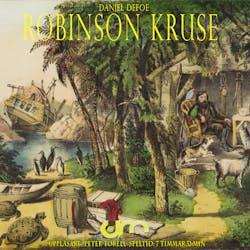Moll Flanders is a novel by Daniel Defoe, first published in 1722. It purports to be the true account of the life of the eponymous Moll, detailing her exploits from birth until old age. By 1721, Defoe had become a recognised novelist, with the success of Robinson Crusoe in 1719. His political work was tapering off at this point, due to the fall of both Whig and Tory party leaders with whom he had been associated; Robert Walpole was beginning his rise, and Defoe was never fully at home with the Walpole group. Defoe's Whig views are nevertheless evident in the story of Moll, and the novel's full title gives some insight into this and the outline of the plot: The Fortunes and Misfortunes of the Famous Moll Flanders, &c. Who was Born in Newgate, and during a Life of continu'd Variety for Threescore Years, besides her Childhood, was Twelve Year a Whore, five times a Wife (whereof once to her own Brother), Twelve Year a Thief, Eight Year a Transported Felon in Virginia, at last grew Rich, liv'd Honest, and died a Penitent. Written from her own Memorandums. It is usually assumed that the novel was written by Daniel Defoe, and his name is commonly given as the author in modern printings of the novel. However, the original printing did not have an author, as it was an apparent autobiography. The attribution of Moll Flanders to Defoe was made by bookseller Francis Noble in 1770, after Defoe's death in 1731. The novel is based partially on the life of Moll King, a London criminal whom Defoe met while visiting Newgate Prison.

Robinson Kruse
Daniel Defoe, Staffan Götestam
audiobook
Robinson Crusoe
Daniel Defoe
audiobookbook
180 Masterpieces You Should Read Before You Die (Vol.2) : Life is a Dream, The Awakening, Babbitt, Strange Case of Dr Jekyll and Mr Hyde, Sense and Sensibility, A Tale of Two Cities, Dubliners, A Doll's House,Anne of Green Gables, The Hunchback of Notre Dame, Iliad & Odyssey...
Virginia Woolf, P. B. Shelley, Henrik Ibsen, Charles Dickens, James Joyce, Leo Tolstoy, Ford Madox Ford, E. M. Forster, Honoré de Balzac, Jane Austen, L. M. Montgomery, Kenneth Grahame, Rabindranath Tagore, George Weedon Grossmith, F. Scott Fitzgerald, Daniel Defoe, Jules Verne, Jonathan Swift, James Fenimore Cooper, George MacDonald, J. M. Barrie, Alexandre Dumas, Homer, Benito Pérez Galdós, Dante, William Dean Howells, Kakuzo Okakura, Gustave Flaubert, Victor Hugo, Stendhal, John Buchan, Edgar Wallace, William Walker Atkinson, Émile Coué, G. K. Chesterton, D.H. Lawrence, George Bernard Shaw, Joseph Conrad, Walter Scott, Anthony Trollope, Emile Zola, Theodor Storm, Harriet Beecher Stowe, Nathaniel Hawthorne, Henry Fielding, Jerome K. Jerome, Laurence Sterne, Thomas Hardy, Willa Cather, Edith Wharton, Kate Chopin, Sinclair Lewis, W. Somerset Maugham, Henry James, Ivan Turgenev, Nikolai Gogol, Pedro Calderon de la Barca, Johann Wolfgang von Goethe, Benjamin Franklin, Bankim Chandra Chatterjee, Edgar Allan Poe, Willkie Collins, Ann Ward Radcliffe, Bram Stoker, Gaston Leroux, H. G. Wells, Lewis Wallace, Washington Irving, Machiavelli, Fyodor Dostoyevsky, Confucius, Laozi, John Milton, W. B. Yeats, Elizabeth von Arnim, Cao Xueqin
book
Library of Masterpieces - 100 Books to Read in a Lifetime
illiam Shakespeare, Fyodor Dostoevsky, Louisa May Alcott, Miguel de Cervantes, John Milton, Jane Austen, Charlotte Brontë, Emily Brontë, Anne Brontë, William Makepeace Thackeray, George Eliot, Charles Dickens, Thomas Hardy, Jonathan Swift, Daniel Defoe, Joseph Conrad, Robert Louis Stevenson, Mary Shelley, Bram Stoker, Arthur Conan Doyle, Wilkie Collins, Oscar Wilde, T. S. Eliot, D. H. Lawrence, James Joyce, Virginia Woolf, E. M. Forster, Evelyn Waugh, Aldous Huxley, George Orwell, H. G. Wells, Lewis Carroll, Frances Hodgson Burnett, Kenneth Grahame, C. S. Lewis, Malcolm Lowry, Ford Madox Ford, Mark Twain, Jack London, Herman Melville, Ernest Hemingway, Jack Kerouac, Nathaniel Hawthorne, Edith Wharton, Walt Whitman, Kate Chopin, Harriet Beecher Stowe, Neale Hurston, Richard Wright, Raymond Chandler, Dashiell Hammett, F. Scott Fitzgerald, John Steinbeck, William Faulkner, Margaret Mitchell, Sylvia Plath, Carson McCullers, L. Frank Baum, L. M. Montgomery, Leo Tolstoy, Ivan Turgenev, Nikolai Gogol, Johann Wolfgang von Goethe, Friedrich Nietzsche, Thomas Mann, Franz Kafka, Erich Maria Remarque, Albert Camus, Marcel Proust, Jules Verne, Victor Hugo, Gustave Flaubert, Stendhal, Alexandre Dumas, Henrik Ibsen, Rudyard Kipling, Homer, Sophocles, Virgil, Laozi, Sun Tzu, Plato, Marcus Aurelius, Dante Alighieri, Niccolò Machiavelli
book
180 Masterpieces You Should Read Before You Die (Vol.1) : Leaves of Grass, Siddhartha, Middlemarch, The Jungle, Macbeth, Moby-Dick, A Study in Scarlet, The Call of the Wild, Huckleberry Finn,, The Way We Live Now, Sister Carrie...
Walt Whitman, George Eliot, Herman Hesse, Kahlil Gibran, Anton Chekhov, Herman Melville, Oscar Wilde, Fyodor Dostoevsky, William Shakespeare, Mark Twain, Marcus Aurelius, Nikolai Gogol, James Joyce, Henry David Thoreau, T. S. Eliot, John Keats, Charles Baudelaire, Walter Scott, Daniel Defoe, Louisa May Alcott, Jane Austen, Charlotte Brontë, Emily Brontë, Anne Brontë, Leo Tolstoy, Victor Hugo, Jules Verne, Lewis Carroll, Frances Hodgson Burnett, Brothers Grimm, Hans Christian Andersen, Agatha Christie, Wallace D. Wattles, James Allen, Sigmund Freud, Miguel de Cervantes, Frederick Douglass, Voltaire, Sun Tzu, Plato, Upton Sinclair, Anthony Trollope, E. M. Forster, Theodore Dreiser, Charles Dickens, Thomas Hardy, Henry James, D. H. Lawrence, William Makepeace Thackeray, Marcel Proust, H. G. Wells, Edgar Allan Poe, Ernest Hemingway
book
90 Masterpieces You Must Read (Vol.1) : Novels, Poetry, Plays, Short Stories, Essays, Psychology & Philosophy: The Madman, Moby-Dick, Siddhartha, Crime and Punishment, Hamlet, Great Expectations, Little Women, Meditations, The Einstein Theory, Heart of Darkness, The Red Badge of Courage
Walt Whitman, Herman Hesse, George Eliot, Kahlil Gibran, Anton Chekhov, Herman Melville, Oscar Wilde, Fyodor Dostoevsky, Nikolai Gogol, James Joyce, Henry David Thoreau, William Shakespeare, T. S. Eliot, John Keats, Charles Baudelaire, Walter Scott, Daniel Defoe, Louisa May Alcott, Jane Austen, Charlotte Brontë, Emily Brontë, Anne Brontë, Leo Tolstoy, Benito Pérez Galdós, William Makepeace Thackeray, Pierre Choderlos de Laclos, R.D. Blackmore, Alexandre Dumas, Marcel Proust, D. H. Lawrence, Charles Dickens, Thomas Hardy, Henry James, Guy de Maupassant, Princess Der Ling, Victor Hugo, Juan Valera, Anthony Trollope, Stephen Crane, E. M. Forster, Theodore Dreiser, Margaret Cavendish, Upton Sinclair, Plato, Apuleius, Marcus Aurelius, Sun Tzu, Voltaire, Miguel de Cervantes, Giovanni Boccaccio, Frederick Douglass, Sigmund Freud, H. A. Lorentz, Wallace D. Wattles, James Allen, Agatha Christie, Arthur Conan Doyle, Joseph Conrad, H. P. Lovecraft, Washington Irving, Mary Shelley, H. G. Wells, Edgar Allan Poe, Ernest Hemingway, L. Frank Baum, Robert Louis Stevenson, Mark Twain, Selma Lagerlöf, Jack London, Jules Verne, Lewis Carroll, Frances Hodgson Burnett, Rudyard Kipling, George Bernard Shaw, Soseki Natsume, Johann Wolfgang Goethe, Edgar Rice Burroughs, Brothers Grimm, Hans Christian Andersen
book
Something Wicked: 560+ Horror Classics, Macabre Tales & Supernatural Mysteries : The Call of Cthulhu, Frankenstein, Dracula, The Murders in the Rue Morgue, Dr Jekyll & Mr Hyde…
H. P. Lovecraft, H. G. Wells, Edgar Allan Poe, Henry James, Hugh Walpole, M. R. James, Wilkie Collins, E. F. Benson, Nathaniel Hawthorne, Ambrose Bierce, Arthur Machen, William Hope Hodgson, Arthur Conan Doyle, Grant Allen, Mary Shelley, Bram Stoker, Théophile Gautier, Richard Marsh, Joseph Sheridan Le Fanu, Thomas Hardy, Charles Dickens, Rudyard Kipling, Guy de Maupassant, Elizabeth Gaskell, Mark Twain, Daniel Defoe, Jerome K. Jerome, Fitz-James O'Brien, Catherine Crowe, Émile Erckmann, Alexandre Chatrian, Pedro De Alarçon, Amelia B. Edwards, Washington Irving, John Meade Falkner, Harriet Beecher Stowe, Mary E. Wilkins Freeman, Louisa M. Alcott, Edith Nesbit, Mary Louisa Molesworth, Francis Marion Crawford, John Kendrick Bangs, John Buchan, Sabine Baring-Gould, Cleveland Moffett, Louis Tracy, Nikolai Gogol, James Malcolm Rymer, Thomas Peckett Prest, Frederick Marryat, Oscar Wilde, Robert Louis Stevenson, Charlotte Perkins Gilman, W. W. Jacobs, Wilhelm Hauff, Mary Elizabeth Braddon, Robert W. Chambers, Edward Bulwer-Lytton, Thomas De Quincey, William Makepeace Thackeray, E. T. A. Hoffmann, Robert E. Howard, David Lindsay, Marie Belloc Lowndes, Edward Bellamy, Jack London, Pliny the Younger, Helena Blavatsky, Fergus Hume, Florence Marryat, Villiers l'Isle de Adam, William Archer, William F. Harvey, Katherine Rickford, Ralph Adams Cram, Leopold Kompert, Brander Matthews, Vincent O'Sullivan, Ellis Parker Butler, A. T. Quiller-Couch, Fiona Macleod, Lafcadio Hearn, William T. Stead, Gambier Bolton, Andrew Jackson Davis, Nizida, Walter F. Prince, Chester Bailey Fernando, Leonard Kip, Frank R. Stockton, Bithia Mary Croker, Catherine L. Pirkis, Leonid Andreyev, Anatole France, Richard Le Gallienne, Lucy Maud Montgomery, Stanley G. Weinbaum, Horace Walpole, William Thomas Beckford, Matthew Gregory Lewis, Ann Radcliffe, Jane Austen, William Polidori, Charlotte Brontë, Emily Brontë, Walter Hubbell, George W. M. Reynolds, M. P. Shiel, Adelbert von Chamisso, Saki, H. H. Munro
book
50 Timeless Masterpieces (Volume 1) : Essential Classics for a Rich Literary Journey
Homer, Sun Tzu, Plato, Dante, Shakespeare, Miguel de Cervantes, John Milton, Daniel Defoe, Johann Wolfgang von Goethe, Jane Austen, Nikolai Gogol, Emily Brontë, Mary Shelley, Alexandre Dumas, Fyodor Dostoevsky, Charles Dickens, Victor Hugo, Nathaniel Hawthorne, Gustave Flaubert, Leo Tolstoy, Henrik Ibsen, Herman Melville, Mark Twain, Robert Louis Stevenson, Arthur Conan Doyle, Raymond Chandler, H. G. Wells, Joseph Conrad, Rudyard Kipling, Louisa May Alcott, L. Frank Baum, L. M. Montgomery, T. S. Eliot, Franz Kafka, James Joyce, Virginia Woolf, C. S. Lewis, Ernest Hemingway, Walt Whitman, Jack Kerouac, John Steinbeck, William Faulkner, Kate Chopin, Zora Neale Hurston, Margaret Mitchell, Sylvia Plath, Thomas Mann, Albert Camus, George Orwell
book
Robinson Crusoe
Daniel Defoe
audiobookbook
Robinson Kruse
Daniel Defoe, Peter Gotthardt
audiobookbook
Robinson Kruse
Daniel Defoe
audiobook
The Complete Harvard Classics - All 51 Volumes in One Edition : The Anthology of the Greatest Works of World Literature - Dr. Eliot's Five Foot Shelf
Plato, Marcus Aurelius, William Shakespeare, Benjamin Franklin, Homer, Friedrich von Schiller, William Makepeace Thackeray, John Ruskin, Robert Louis Stevenson, Edgar Alan Poe, Henry David Thoreau, Voltaire, Jean Jacques Rousseau, Immanuel Kant, Thomas Hobbes, John Woolman, William Penn, Epictetus, Francis Bacon, John Milton, Thomas Browne, Ralph Waldo Emerson, Robert Burns, Saint Augustine, Thomas à Kempis, Aeschylus, Sophocles, Euripides, Aristophanes, Marcus Tullius Cicero, Pliny the Younger, Adam Smith, Charles Darwin, Plutarch, Virgil, Miguel de Cervantes, John Bunyan, Izaak Walton, Aesop, Wilhelm Grimm, Jacob Grimm, Hans Christian Andersen, John Dryden, Richard Brinsley Sheridan, David Garrick, Oliver Goldsmith, Percy Bysshe Shelley, Robert Browning, George Gordon Byron, Johann Wolfgang von Goethe, Christopher Marlowe, Dante Alighieri, Alessandro Manzoni, Richard Henry Dana, Edmund Burke, John Stuart Mill, Thomas Carlyle, Pedro Calderón de la Barca, Pierre Corneille, Jean Racine, Molière, Gotthold Ephraim Lessing, Philip Sidney, Ben Jonson, Abraham Cowley, Joseph Addison, Richard Steele, Jonathan Swift, Daniel Defoe, Samuel Johnson, David Hume, Sydney Smith, Samuel Taylor Coleridge, William Hazlitt, Leigh Hunt, Charles Lamb, Thomas De Quincey, Thomas Babington Macaulay, James Russell Lowell, Michael Faraday, Hermann Ludwig Ferdinand von Helmholtz, Simon Newcomb, Archibald Geikie, Benvenuto Cellini, Michel de Montaigne, Charles Augustin Sainte-Beuve, Ernest Renan, Giuseppe Mazzini, Herodotus, Tacitus, Francis Drake, Philip Nichols, Francis Pretty, Walter Bigges, Edward Haies, Walter Raleigh, René Descartes, Jean Froissart, Thomas Malory, William Henry Harrison, Niccolo Machiavelli, William Roper, Thomas More, Martin Luther, John Locke, George Berkeley, Hippocrates, Ambroise Paré, William Harvey, Oliver Wendell Holmes, Joseph Lister, Louis Pasteur, Thomas Dekker, Francis Beaumont, John Fletcher, John Webster, Philip Massinger, Blaise Pascal, William A. Neilson
book
